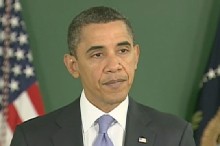WASHINGTON – Crumbling inner-city sidewalks, cleaner air, dirtier drinking water, more debt for some college students and higher heating costs for low-income families could be part of the legacy of President Barack Obama's proposed budget. One way or another, his effort to save money in hundreds of programs might touch every American.
No rewrite of the family budget is called for at this point. Obama's plan is little more than a wish list, certain to be reshaped by Congress if it even goes anywhere. (Last year's wish list didn't.)
But it shows where Obama wants to go, how he proposes to get there and, to some extent, what spending cuts and increases he is willing to fight for in a divided Congress where Republicans want to cut far more.
So if you are an older worker looking for the government's help training for a new job, for example, you might get a little nervous. Obama wants to halve a program that helps seniors with career or community service training.
Obama's budget would squeeze the poor on several fronts, the rich on one big front — their taxes — and others in scattered ways.
People living in or needing public housing will take a hit if he gets his way. Obama wants to spend much less to maintain public housing and to build new homes for the elderly and disabled. He also wants to cut by half the grants that provide poorer families with substantial help paying their energy bills.
And low-income students may feel a pinch with the president's plan to eliminate Pell grants for summer school. The savings would be used to keep the maximum Pell grant for the regular academic year uncut.
When a Democratic president and Republican lawmakers want to cut the same program, it's a safe bet that program is at risk. So it is with public housing, some environmental programs and certain other areas of spending.
Tax increases, though, are a much iffier proposition. In his budget, Obama proposes once more to raise taxes on the rich, not just increasing their rates but limiting their charitable, mortgage-interest and state-tax deductions. He gave up trying to increase taxes on the wealthy in the last round of wrangling but is trying again.
Government is so complex and sprawling that multiple spending programs are often aimed at the same problem, or very similar ones, and it can be a fool's game trying to see how it will all shake out. Sometimes, it depends where you live.
For example, Obama is seeking big cuts in grants that help states upgrade sewage treatment and drinking water systems. As well, he wants to do away with a clean-diesel program that his administration says removed tons of pollution and made people healthier. On the other hand, he wants to spend hundreds of millions more to help states meet sweeping air pollution regulations.
After expanding other programs that help students with their college debt, Obama wants to achieve some savings for the government from the same pot. He is proposing to reduce loan subsidies for graduate and professional students, exposing some of them to interest on their college loans while they are still in school.
In other ways, too, the government would give with one hand and take with the other.
Obama proposes a whopping 68 percent increase in Transportation Department spending, with much of the money geared to fixing highways and putting more people in high-speed trains.
Yet the vision of smoother blacktop appears not to extend to all roads. Obama is proposing cuts in community development grants that hard-pressed mayors use for streets, sidewalks, water and sewers in poor neighborhoods.
Many of the changes he wants to make would play out over time. His budget stuffs in billions to improve teaching in the years ahead and specifically to recruit 100,000 math and science teachers over a decade, as well as to bring high-speed wireless to more of rural America. Health research is a big priority, with dividends to come down the road.
Much closer to the here and now is the proposed halving of the Low Income Home Energy Assistance Program, back to its level of 2008. The program cut energy costs for more than 8 million families last year, and an estimated 3.2 million families could lose the subsidies.
"This is a very hard cut," said Jack Lew, Obama's budget director, who helped to create the program in the late 1970s. "This is a cut that has real impact."
___
Associated Press writer Darlene Superville contributed to this report.




